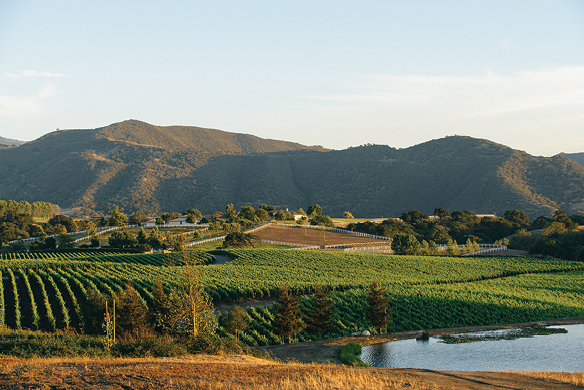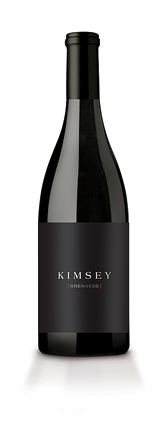- Home
- Media Kit
- Current Issue
- Past Issues
- Ad Specs-Submission
- Ad Print Settings
- Reprints (PDF)
- Photo Specifications (PDF)
- Contact Us

![]()
ONLINE

Rhone Varietals
Editors’ Note
William Kimsey has held his current post since July 2005. He is also Managing Director of Kimsey Consulting. He previously held several leadership positions at Ernst & Young, retiring in 2002 as Chief Executive Officer of Ernst & Young Global.
Vineyard Brief
William and Nancy Kimsey established a small, 22-acre vineyard in the Ballard Canyon appellation of Santa Barbara County. The development of this vineyard was a purposeful one. Devotees of pleasurable, cerebral wines, the Kimseys had long searched for a site amenable to growing grape varieties they found most compelling, namely several found in the Rhone region of France: Syrah, Grenache, Viognier, and Roussanne. Today, the Kimsey estate vineyard (kimseyvineyard.com) terroir has proven itself cordial to these enduring varieties.
What led to your desire to get into the wine business?
When we were living in London, Nancy and I thought about buying an older vineyard in Italy with an old villa, and we would remodel the villa and rejuvenate the vineyard. Later, we had even considered buying a vineyard in Australia.
But the feeling subsided until we moved to Santa Barbara. We fell in love with the Santa Ynez Valley. We bought a great piece of land and the burning desire to own a vineyard came back.

Kimsey Vineyards
Did you look at it initially as a business or a hobby?
When we bought the land, we actually didn’t know for sure what we were going to do with it. We bought the land in 2005 and at the time were building our home in Santa Barbara and some commercial buildings, and we finished all that in 2007. In 2008, we decided it was a great spot and had the soil tested to see if it would work for a vineyard. The results were strong and we started consulting with experts and then planting in 2008. So it was started as a business enterprise from the beginning.
At that stage, did you have any vision of what this whole thing would become?
Our desire was to make wonderful quality wines – wines that people would fall in love with. We knew we would always be small and we would not have a chance of it being a good business unless the wine was of very high quality. We hired the best farmers, consultants, and winemaker in the area, and now we have the best marketing consultants. So it is very much a business for which the success depends on producing great quality wines.

Kimsey Grenache
How have the wines developed and how have you gone to market with them?
The wines are all Rhone varietals that grow well in the Rhone Valley of France. We’re right in the center of an area called Ballard Canyon. One mile to the East, it gets one degree hotter, so at the extreme end of the area, they grow Bordeaux varietals.
Likewise, one mile to the West, it gets one degree cooler. That is where they have Pinots and other Burgundies.
In the center, it’s perfect for the Rhone varietals, so the land and climate dictated the decision. It is simply an ideal area for Rhones. We used consultants to determine the various clones of Syrah, which comprise about 85 percent of our grapes. We have three acres of Grenache, a bit of white, Roussanne, and Viognier. It’s basically a red wine vineyard, and a Syrah vineyard, though the Grenache seems to be catching on quite well with customers.
What type of quantity are you able to produce?
The consultant we worked with tried to avoid every mistake that he was aware of making in his wine career and one good tactic was to plant the vineyard very densely. The rows are six feet apart and the vines are 2.5 feet apart – very different than an old style vineyard. It can be pruned severely and still produce 3.5 to 4 tons an acre.
Our first harvest was in 2011. We didn’t have the winemaker we wanted and sold all the limited crop we produced. In 2012, we started making wine.
The vineyard will produce nearly 3,000 cases even if it’s heavily pruned, but we’re limiting our own Kimsey brand production to around 500 cases at this early stage until the brand value is developed. For now we will continue selling the balance of the grapes to other producers.
How hard is it to build awareness and tell the story about the wine?
It’s challenging. Even getting the best distributors is not easy. In the beginning, we will have to sell much of our product through distributors, which is not as good economically. As the brand becomes better known, we are hoping to do more direct sales and to increase the production of our brand.
Are your sales focused only on California at this time?
Yes, the distributorship is, but we are licensed to sell in several states. We’re issuing our first release letter for the 2012s soon and plan to develop a much broader direct sales program outside of California.
Is sustainability important today?
The world, and particularly the U.S., is going more toward organic every day and so we went organic from the beginning. We don’t use insecticides or pesticides, even outside the fence. Our vineyard is certified organic, which is more expensive due to higher farming costs.
How involved are you in the day-to-day operations?
Every day, I’m involved in a very detailed sense with one exception. A lot of the fun for winery owners is to get involved in the blending, the winemaking. Nancy and I haven’t done the blending of the wines because we don’t trust our own taste or flavor judgement nearly as much as we trust our winemaker, Matt Dees.
Do you find it challenging in that so many elements of this process aren’t within your control?
Yes, farming is definitely that way. But, I grew up on a farm so I learned early the role Mother Nature plays. From the beginning, we put in a frost protection system, which a lot of vineyards in the area don’t have, and that has helped to reduce the risk of losing a crop due to frost in the springtime after the bud break.
What reaction do you get to Syrah from those who may not know it well?
People who don’t know Syrah often really love it once they try a really good one.
Part of the issue is that there is a fair amount of Syrah on the market that isn’t top quality. Historically, that was even more true.
It helps that many chefs today know the value of a good Syrah for both food preparation and wine pairings.•